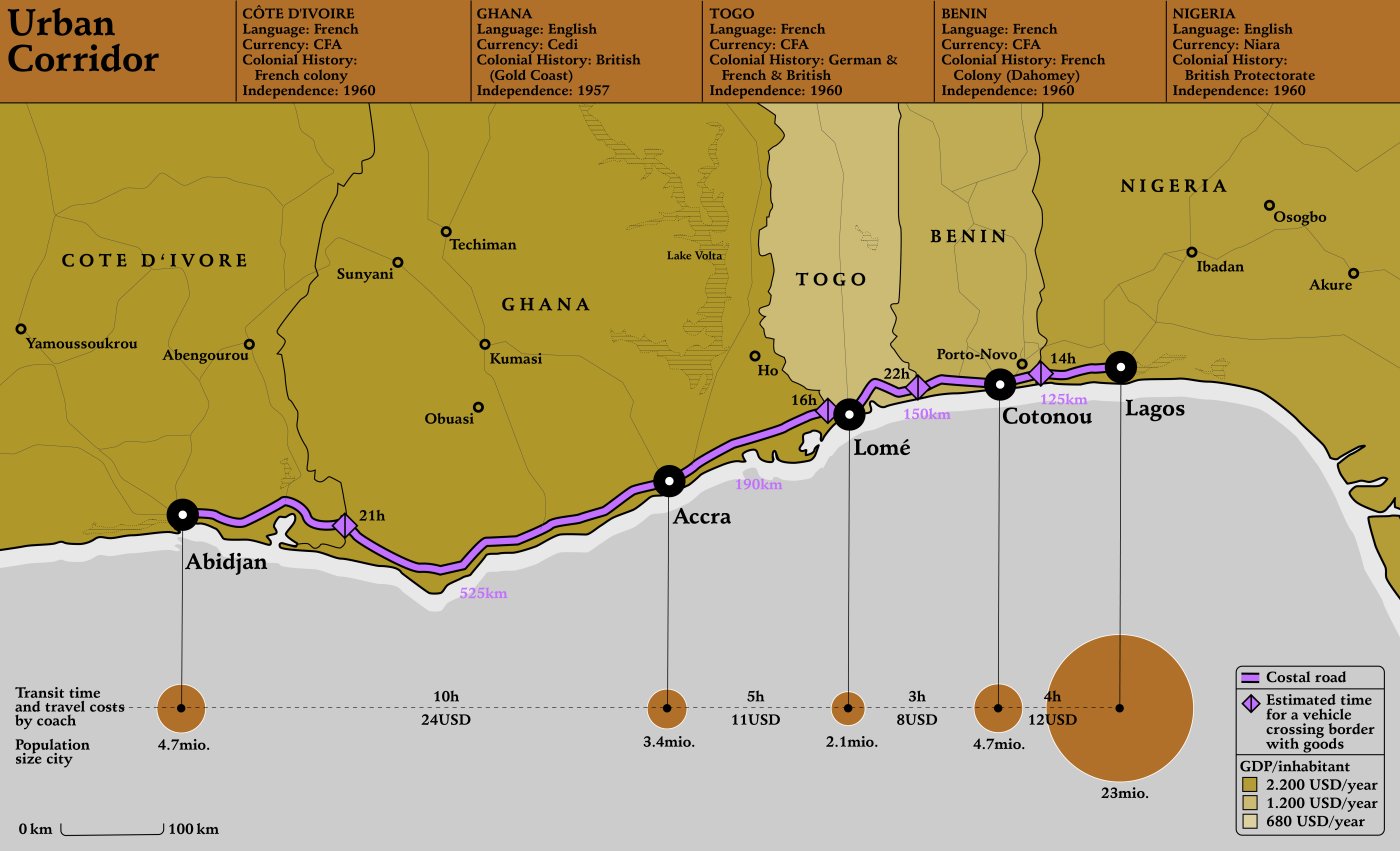Border Closures and Covid-19
Since 2019 two events have slowed down mobility along the Lagos-Abidjan corridor. These two shocks were the closure of the Nigerian-Beninese border in August 2019, and the Covid-19 Pandemic.
The border closure with Nigeria occurred overnight on the 20th August 2020, and was implemented without warning to the neighbor states, and in clear violation of regional trade treaties within the ECOWAS region. The decision aimed to stem the importation of smuggled and counterfeit goods into Nigeria and reinforce protectionist policies, notably with regards to rice. President Buhari was quoted as saying, “we have saved millions of dollars and realized that we do not need to import rice. We have achieved national food security. We have limited the importation of drugs and the proliferation of firearms that was threatening our country.”1 The borders were also closed between Nigerian and Cameroon and Niger, but the application was less strict.
The impact of the border closure on the Beninese economy was considerable, especially for the port of Cotonou where 80% of imports are destined for Nigeria. But as the geographer John Igué stated in an interview on a private radio station, “the nice folks who have been reporting on this say that Nigeria contributes 20% to the national budget. That’s very nice, but it just doesn’t take into account all of the informal economy. Remember what is happening here, is that Nigeria has closed the border all the way up to the north.” For the Beninese border town Sèmè-Kraké the border closure has brought a halt to the many urban livelihoods sustained through the constant flow of passengers. For example, the 250 people who earn a living exchanging currency on the border no longer have any clients. As their secretary Élie Houssougoun reported, “business has fallen, I’m counting on my savings to survive.” 2
As such, the migration that was driving urbanisation along the corridor has come to a standstill and the livelihoods of urban locations that were relying on tying into the circulation of trade and people is under threat. This does not mean however that the border closure has slowed down urbanization processes completely. Instead, urban growth has relocated to within Nigeria, with for example an increase in the cargo being cleared in the port of Lagos. What we see here, is that as circulation along the corridor decreased, urbanisation was concentrated in Lagos as opposed to being distributed along the corridor. This highlights just how important the Nigerian economy is for urban livelihoods in South Benin. President Buhari and President Talon met, not in West Africa, but in Tokyo in late August 2019, whilst attending a summit to discuss border re-openings, but at the time of writing, there has been no formal reopening of the border. Whilst there were some signs of a reopening in February 2020 these were rapidly shelved in the context of the Covid-19 pandemic.
The Covid-19 pandemic, for reasons that are not currently understood, has not taken hold as dramatically in West Africa as in Europe and North America. As the virus was slow to spread, many went on to joke on social media, “the Chinese have sent us the kpayo (counterfeit) version of the virus.” Whilst former colonial powers were slow to react in delivering sanitary assistance and aid, China was quick to provide support. The Chinese millionaire Jack Ma donated masks, PPE, and testing kits to the Beninese health ministry. It could be that the epidemic contributes to reinforcing Chinese stakes in Africa, and signaling limits of Western intervention in the region.
None-the-less, despite the Chinese donations with very limited health care infrastructure, it became quickly apparent that whilst hospitals would be unable to cope with high levels of infection, it would also be unfeasible to impose a general lockdown on the population. As the one Indian doctor commented, “Social distancing is a privilege. It means you live in a house large enough to practise it. Hand washing is a privilege too. It means you have access to running water. Hand sanitisers are a privilege. It means you have money to buy them. Lockdowns are a privilege. It means you can afford to be at home. Most of the ways to ward the Corona off are accessible only to the affluent.”3 The pandemic has highlighted that it is politically, economically, socially impossible to impose immobility on the West African population. As people earn their incomes daily and the economic system functions on many intermediary jobs, with tasks and errands being divided and delegated to various people, it is not possible to confine people within their households, especially given accommodation overcrowding.
Officially Benin kept its borders open, and instead imposed a cordon sanitaire around the urban agglomeration in the south east. In March 2020 the government then took the following measures: land border crossings were limited to the strictly necessary, screening was set up at the Cotonou airport, there was a restricted delivery of visas, with a quarantine of 14 days for arrivals from impacted countries. Government trips abroad were suspended, along with trips to Mecca. A cordon sanitaire was then put into place. What this cordon did in theory was to restrict urban-rural linkages - enabling urban residents to circulate within the metropolitan areas, but not travel back and forth. None-the-less, many urban residents returned to their home villages, concerned that economic downturn and overcrowding in the cities would endanger them. This highlights how important the attachment to the village still is for urban dwellers, seen as a place to retreat to in case of crisis in the towns and cities.

